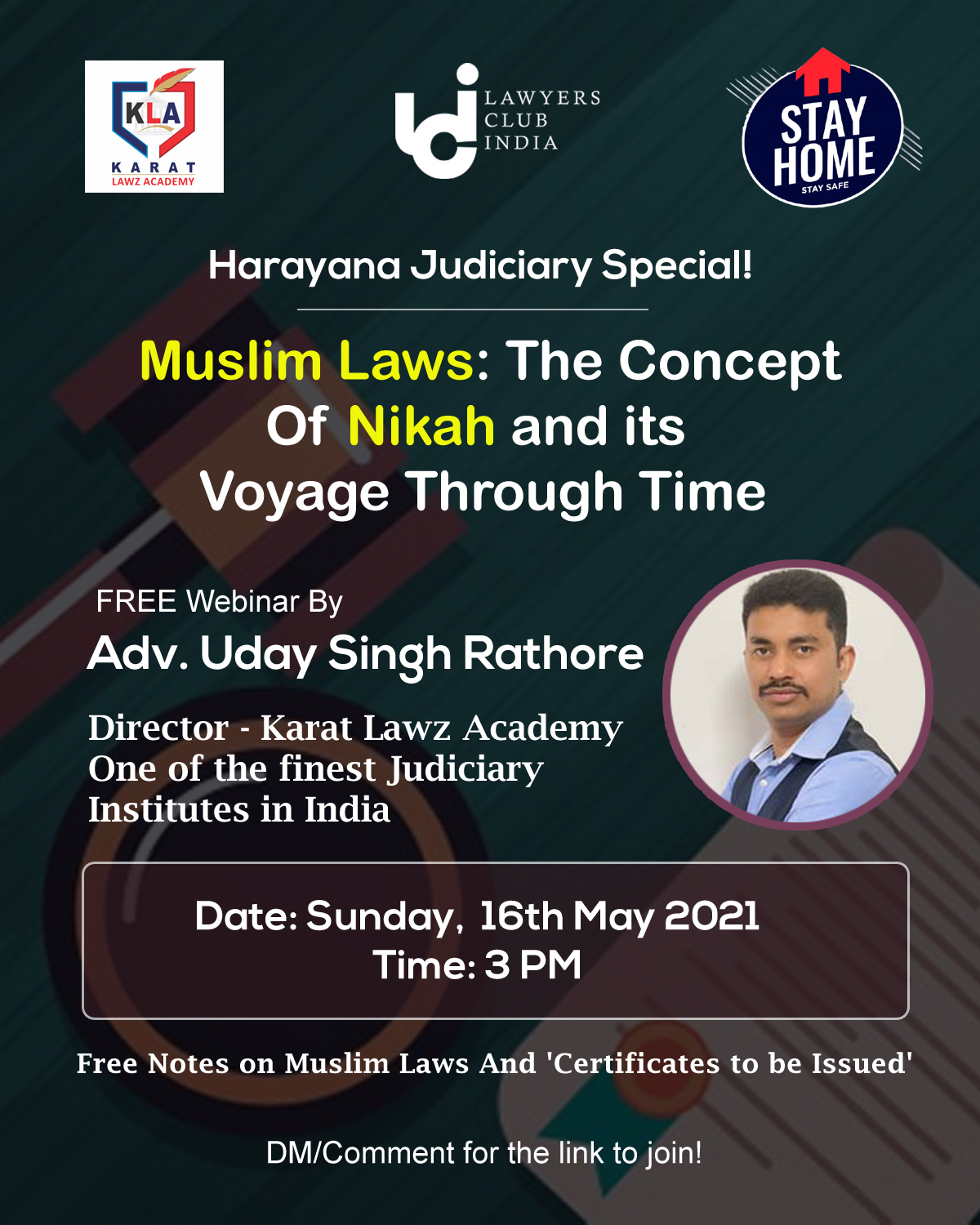Coverage of this Article
1. THE MUSLIM PERSONAL LAW (SHARIAT) APPLICATION ACT, 1937
A. HISTORY AND ORIGIN OF THE LAW
-Talking about the history of Muslim Personal Law it was seen that during the colonial era, the British Courts would consult Hidayah, written by Mirghayani, a Hanafi Scholar, and then have it translated into English by Hamilton.
Origin of the Law
-Before Islam was introduced as a religion to Arabia, a tribal social structure was prevalent.
Preamble of the Act
-This is an Act to make provision for the application of the Muslim Personal Law (Shariat) to Muslims. It is expedient to make provision for the application of the Muslim Personal Law (Shariat) to Muslims to avoid the injustice and the chaos.
Short title and extent as mentioned
-This Act may very well be called The Muslim Personal Law (Shariat) Application Act, 1937.
1. THE MUSLIM PERSONAL LAW (SHARIAT) APPLICATION ACT, 1937
A. HISTORY AND ORIGIN OF THE LAW
● Talking about the history of Muslim Personal Law it was seen that during the colonial era, the British Courts would consult Hidayah, written by Mirghayani, a Hanafi Scholar, and then have it translated into English by Hamilton.
● This choice of Hanafi Law was rooted in the fact that the ruling class before the British, was the Mughals, who were Hanafis.
● In order to make the masses most adaptable to their rule, the British followed the procedure that followed English Law and the substantive part was based on Hidayah, which later came to be known as Anglo-Mohammedan Law, now called as Muslim Personal Law (Shariat law).
● The Shariat law has not remained static over centuries. Since the period when the Prophet was alive, the legislation mentioned in the Quran kept developing in response to practical problems faced by the Prophet and his community. Modern time Islamic Nation States have responded to the needs of modernity by embracing the Shariat in ways suiting their social and political needs. Consequently, there are four different schools of Islamic law, each of which interprets the writings in the Quran in different ways and consists of varying rules and regulations for the Islamic community all over the world.
● The four schools of Islamic law are (Hanafiyya, Malikiyya, Shafiyya and Hanabaliyya) which were developed in four different centuries.

Origin of the Law
● Before Islam was introduced as a religion to Arabia, a tribal social structure was prevalent.
● The tribe as a whole held the duty to determine what law was. The rules were unwritten. These laws made by the tribe were modified with time, as and when society felt the need for change.
● In the seventh century, the Muslim community was established in Medina, after Prophet travelled to Medina after being ousted by the people of Mecca, but as the luck would have it, Prophet became very popular in Medina and Islam soon started spreading to the surrounding regions. The establishment of Islam, the will of God, as transmitted in the Quran as the revelations of Gabriel in the Hira cave to Muhammad, came to supersede every tribal custom which was created prior.
● The writings in the Quran along with unwritten customs, are also known as the Shariat. That is what governs the Islamic society. In addition to this, the Shariat is also based on the Hadith (actions and words of the Prophet as recorded by his companions). Originally, they were very broad and general solutions to practical problems in society but later on they have become more specific.
● The Shariat Act officially came into force on 7th October, 1937, until when the law was unwritten as a statute.
Preamble of the Act
This is an Act to make provision for the application of the Muslim Personal Law (Shariat) to Muslims. It is expedient to make provision for the application of the Muslim Personal Law (Shariat) to Muslims to avoid the injustice and the chaos.
Short title and extent as mentioned
● (1) This Act may very well be called The Muslim Personal Law (Shariat) Application Act, 1937.
(2) It extends to the whole of India.
● All the Muslims living in India are governed by the Muslim Personal Law (Shariat) Application Act, 1937.
● The Shariat can be simply explained as being the provisions in the Quran as well as the teachings and practices of Prophet Mohammad.
● Accordingly, we can see that Article 14 of the Indian Constitution grants “equal protection of law” to all its citizens, but when it comes to personal issues (marriage, divorce, inheritance, custody of children, etc), Muslims in India are governed by their very own laws, that is, the Muslim Personal Law which came into force in 1937, and that the State shall not interfere.
Click here to download the Complete Muslim Law Notes (FREE)
Join LAWyersClubIndia's network for daily News Updates, Judgment Summaries, Articles, Forum Threads, Online Law Courses, and MUCH MORE!!"
Tags :others












